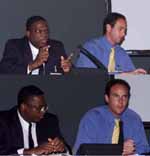|
|
![]() In this real audio interview,
Deborah Wilson Cornland of the SEI discusses initiatives aimed at promoting clean city
vehicles, as well as her hopes for the COP4.
In this real audio interview,
Deborah Wilson Cornland of the SEI discusses initiatives aimed at promoting clean city
vehicles, as well as her hopes for the COP4.
 Deborah Wilson Cornland,
PhD, deborah.cornland@sei.se, and Tommy
Månnson, Stockholm Environment Institute (SEI), lead the discussion on an initiative for
a sustainable transportation sector Deborah Wilson Cornland,
PhD, deborah.cornland@sei.se, and Tommy
Månnson, Stockholm Environment Institute (SEI), lead the discussion on an initiative for
a sustainable transportation sector |
Annex I Parties trends and statistics Organised by the UNFCCC, the meeting presented Annex I trends and statistics, including an overview of the second compilation and synthesis of second national communications from Annex I Parties. Information presented included changes in GHG emissions (1990-95) and Annex I projections.
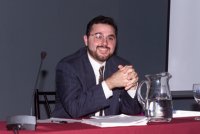 |
The Clean Development Mechanism panel
This event saw the launch of a UNDP report called Issues and Options for The Clean Development Mechanism. The report includes contributions from invited authors with a variety of backgrounds and perspectives on the CDM.
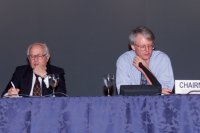 Prof. José Goldemberg (the
report's editor), Instituto de Eletrotécnica e Energia, Universidade de São Paulo, golemb@iee.usp.br, and Thomas Johansson, UNDP, thomas.johansson@undp.org were among a group
of panlists that discussed these issues at the meeting.
Prof. José Goldemberg (the
report's editor), Instituto de Eletrotécnica e Energia, Universidade de São Paulo, golemb@iee.usp.br, and Thomas Johansson, UNDP, thomas.johansson@undp.org were among a group
of panlists that discussed these issues at the meeting.
Web site: http://www.undp.org |
IGCC PANEL PRESENTATIONS
First panel: ABRUPT CLIMATE CHANGE
Moderator: Stephen Schneider
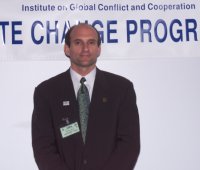 Michael
Molitor, University of California (San Diego), Center for Environmental
Research and Training (http://www-igcc.ucsd.edu),
said the basic science supporting the climate change negotiations has characterized a slow
and gradual build-up of greenhouse gases in the atmosphere from human activities. This
characterization has led many negotiators to believe that the climate system can be
expected to react to growing human emissions through a slow and gradual, or
"linear", response. The recent work of climate scientists now suggests that this
view may not be completely accurate. Paleoclimate evidence now supports the possibility of
abrupt changes in the climate system that could occur over time scales of decades instead
of centuries. One important scenario is linked to rapid changes in the thermohaline
circulation of the North Atlantic Ocean. Negotiators need to think of the climate system
as being capable of switching quickly from one mode of operation to another (i.e.
"non linear" responses). This should have the effect of greatly modifying the
perception of risk by negotiators and their willingness to take early action to lower
emissions in the absence of complete scientific certainty concerning the timing and human
impacts of climate change. Stefan Rahmtorf, Potstdam Institute for Climate Impact
Research (PIK), said rapid changes in the Atlantic ocean circulation are probably
responsible for some of the dramatic climatic ‘flips’ that occurred during the
last Ice Age. He suggested that there is a risk that the North Atlantic Current might
collapse altogether in the long run if global warming continues unabated, and will be
weakened by 20-50% over the next 100 years. Stephen Schneider, Stanford University,
said it is increasingly evident that the climatic system, as noted in the 1996 IPCC
Working Group I summary for policymakers, is a "non-linear system" and that
"when rapidly forced, non-linear systems are especially subject to unexpected
behavior." Jeff Severinghaus, University of California, Scripps Institution of
Oceanography, said that recent discoveries from the Greenland ice core drilling program
and from sediment cores in much of the world have demonstrated that the earth’s
climate warmed abruptly, in less than a decade and perhaps as little as three years,
during and at the end of the last ice age some 11,000 years ago. Climate appears to jump
abruptly from one relatively stable state to another relatively stable state, much as a
light switch response only after one pushes on it for some distance, and then t goes all
at once. If for some reason such an abrupt event were to happen now, it would be far more
destructive to society than the greenhouse gas induced warming that is generally expected,
because our adaptation to a changes is critically affected by the speed of the change.
Michael
Molitor, University of California (San Diego), Center for Environmental
Research and Training (http://www-igcc.ucsd.edu),
said the basic science supporting the climate change negotiations has characterized a slow
and gradual build-up of greenhouse gases in the atmosphere from human activities. This
characterization has led many negotiators to believe that the climate system can be
expected to react to growing human emissions through a slow and gradual, or
"linear", response. The recent work of climate scientists now suggests that this
view may not be completely accurate. Paleoclimate evidence now supports the possibility of
abrupt changes in the climate system that could occur over time scales of decades instead
of centuries. One important scenario is linked to rapid changes in the thermohaline
circulation of the North Atlantic Ocean. Negotiators need to think of the climate system
as being capable of switching quickly from one mode of operation to another (i.e.
"non linear" responses). This should have the effect of greatly modifying the
perception of risk by negotiators and their willingness to take early action to lower
emissions in the absence of complete scientific certainty concerning the timing and human
impacts of climate change. Stefan Rahmtorf, Potstdam Institute for Climate Impact
Research (PIK), said rapid changes in the Atlantic ocean circulation are probably
responsible for some of the dramatic climatic ‘flips’ that occurred during the
last Ice Age. He suggested that there is a risk that the North Atlantic Current might
collapse altogether in the long run if global warming continues unabated, and will be
weakened by 20-50% over the next 100 years. Stephen Schneider, Stanford University,
said it is increasingly evident that the climatic system, as noted in the 1996 IPCC
Working Group I summary for policymakers, is a "non-linear system" and that
"when rapidly forced, non-linear systems are especially subject to unexpected
behavior." Jeff Severinghaus, University of California, Scripps Institution of
Oceanography, said that recent discoveries from the Greenland ice core drilling program
and from sediment cores in much of the world have demonstrated that the earth’s
climate warmed abruptly, in less than a decade and perhaps as little as three years,
during and at the end of the last ice age some 11,000 years ago. Climate appears to jump
abruptly from one relatively stable state to another relatively stable state, much as a
light switch response only after one pushes on it for some distance, and then t goes all
at once. If for some reason such an abrupt event were to happen now, it would be far more
destructive to society than the greenhouse gas induced warming that is generally expected,
because our adaptation to a changes is critically affected by the speed of the change.
Peter Doran talked to ![]() Michael
Molitor, the convenor of the Panel on Abrupt Climate Change, about a number of
issues to be raised at IGCC panels at COP-4. Molitor began with a summary of the
presentations at the Abrupt Climate Change presentation.
Michael
Molitor, the convenor of the Panel on Abrupt Climate Change, about a number of
issues to be raised at IGCC panels at COP-4. Molitor began with a summary of the
presentations at the Abrupt Climate Change presentation.
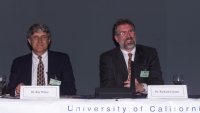 Dr. Ray Weiss, University of California San
Diego, Scripps Institution of Oceanography, and Dr. Richard Carson, IGCC Research Director
for International Environmental Policy, http://www.igcc.ucsd.edu
Dr. Ray Weiss, University of California San
Diego, Scripps Institution of Oceanography, and Dr. Richard Carson, IGCC Research Director
for International Environmental Policy, http://www.igcc.ucsd.edu
Associated Publication: Richard C.J. Somerville (rsomerville@ucsd.edu) is the author of The Forgiving Air: Understanding Environmental Change, a scientist’s account of climate change for the non-scientist.
Panel 2: THE CARBON CYCLE AND SINKS ENHANCEMENT
Moderator: Richard Carson
Sandra Brown of Winrock International discussed methods used to conserve or sequester carbon while at the same time meeting more traditional forestry objectives. She argued that the technical understanding necessary to measure changes in the carbon flows in forests already exists and can be procured at a relatively low cost. Jayant Sathaye, University of California, Lawrence Berkeley National Laboratory, discussed concerns raised regarding forestry and carbon sinks within the context of the Kyoto Protocol.
Susan Trumbore, University of California, Irvine, addressed the complex issue of carbon in soils, which is stored mostly in the form of organic matter. Ray Weiss of the University of California's Scripps Institution of Oceanography, discussed the reservoir of natural carbon dioxide in the oceans.
THE ALUMINIUM LOBBY
One of the industry groups working the lobbies at COP-4 is the International Primary Aluminium Institute. Among their objectives are a confirmation of 1990 as the base year for validating reductions in GHG gases for the period 1990-2008, credit for early action to secure the benefits already achieved and to motivate further action by the industry, a market-based emissions trading system with permits issued at the national rather than at international level, and international global warming measures that have global coverage rather than being confined to OECD countries.
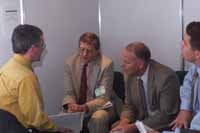 |
NEW REPORTS
REPORT LINKS CLIMATE, POPULATION FUTURES
Expanding people’s power to plan their families could help pave the way to a stable climate, according to a new analysis of per capita greenhouse gas emissions from Population Action International (PAI). The resulting slower rates of population growth would facilitate development of an equitable system of tradable emissions permits that could improve the economic prospects of poorer countries while encouraging global emissions reductions.
Recent negotiations on climate change have all but ignored population trends, according to PAI’s analysis. But population dynamics will increase in importance as governments recognize the need to base long-term climate agreements on a concept of equal rights to use the atmosphere. The PAI report, Profiles in Carbon: An update on Population, Consumption and Carbon Dioxide Emission, is being released at COP-4.
"The atmosphere is the common property of all human beings, and the impacts of human-induced climate change will ignore national borders," said Robert Engelman, director of PAI’s population and environment program and author of the report. "Given the need for broad international support, future climate agreements must recognize that the limited capacity of the atmosphere to absorb greenhouse gases is a resource to be shared fairly by everyone."
Contact Details:
Population Action International: http://www.populationaction.org
Leslie Isom in Washington: lisom@popact.org
Miscelaneous photos:
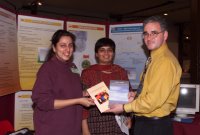 Representatives of the Tata Energy Research Institute (TERI) in New Delhi
(http://www.teriin.org) present copies of two new
publications to the Earth Negotiations Bulletin. The new publications are "Climate
Change: Post Kyoto Perspectives from the South" and "The Clean
Development Mechanism: Issues and Modalities". Representatives of the Tata Energy Research Institute (TERI) in New Delhi
(http://www.teriin.org) present copies of two new
publications to the Earth Negotiations Bulletin. The new publications are "Climate
Change: Post Kyoto Perspectives from the South" and "The Clean
Development Mechanism: Issues and Modalities". E-Mail: mailbox@terri.res.in |
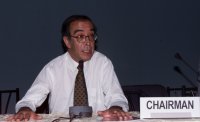 Luiz Gylvan Meira Filhe led a side event on "The Brazilian
Proposal: the attribution of responsibilities for climate change" Luiz Gylvan Meira Filhe led a side event on "The Brazilian
Proposal: the attribution of responsibilities for climate change" |
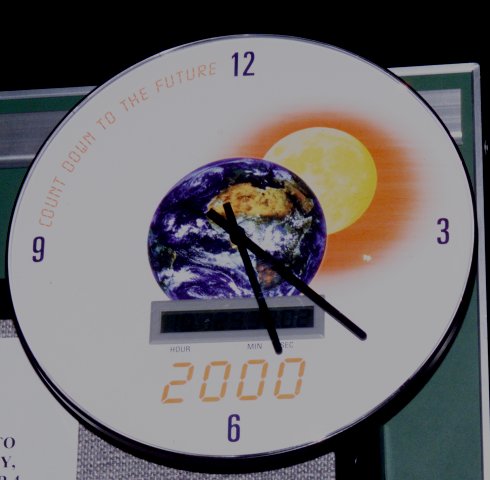 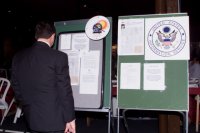 A clock at the United States Information Service wall counts down to the year
2000 A clock at the United States Information Service wall counts down to the year
2000 |
Return to ENB COP-4 home
© Earth Negotiations Bulletin, 1998. All rights reserved.


